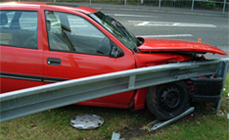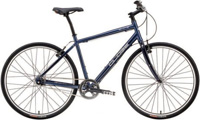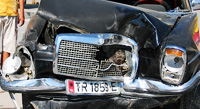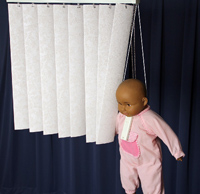Posts Tagged ‘Boston’
Breakstone, White & Gluck Honored as Super Lawyers for Ninth Year
 Breakstone, White & Gluck announces its lawyers have been recognized as 2012 Super Lawyers. It is the ninth consecutive year the firm’s lawyers have been honored.
Breakstone, White & Gluck announces its lawyers have been recognized as 2012 Super Lawyers. It is the ninth consecutive year the firm’s lawyers have been honored.
Attorney Marc L. Breakstone
Attorney Breakstone has been recognized as one of the Top 100 New England Super Lawyers 2012, one of the Top 100 Massachusetts Super Lawyers 2012 and a Massachusetts Super Lawyer in the category of Personal Injury Plaintiff: Medical Malpractice. This is the third time attorney Breakstone has been named a Top 100 New England Super Lawyer, his sixth year as a Top 100 Massachusetts Super Lawyer and his ninth as a Massachusetts Super Lawyer. Breakstone also holds an AV rating with Martindale Hubbell (the highest professional and ethical ranking) and has consistently maintained a “Superb”10.0 rating on AVVO.
Attorney Breakstone is a graduate of Northeastern University School of Law and specializes in personal injury and medical malpractice cases. Click here to read his bio.
Attorney David W. White
Attorney David W. White has been recognized as a 2012 Massachusetts Super Lawyer, Personal Injury Plaintiff: General. It is his ninth consecutive year on the list. Attorney White has also been named to the Top 100 Massachusetts Super Lawyers list four times and to the Top 100 New England Super Lawyers list twice. White also holds an AV rating with Martindale Hubbell (the highest professional and ethical ranking) and has consistently maintained a “Superb”10.0 rating on AVVO.
He is a graduate of Northeastern University School of Law and specializes in personal injury, medical malpractice and bicycle accident cases. Click here to read his bio.
Attorney Ronald E. Gluck
Attorney Ronald E. Gluck has been named a 2012 Massachusetts Super Lawyer, Personal Injury Plaintiff: General. He was selected to the list for the eighth consecutive year. He was also selected to the list of New England Super Lawyers for the sixth year in a row. Attorney Gluck specializes in catastrophic personal injury cases involving car accidents, construction accidents and medical device and pharmaceutical product liability. Gluck has an AV rating with Martindale Hubbell (the highest professional and ethical ranking) and has consistently maintained a “Superb”10.0 rating on AVVO.
He is a graduate of the Case Western Reserve University School of Law. Click here to read his bio.
About Super Lawyers
The Super Lawyers list recognizes the top 5 percent of lawyers in the state. Super Lawyers selects attorneys using a rigorous, multiphase process that includes peer nominations and evaluations and independent research. Each candidate is evaluated on 12 indicators of peer recognition and professional achievement. The object is to create a credible, comprehensive and diverse listing of outstanding attorneys that can be used as a resource for attorneys and consumers to find the best lawyer for their case.
The New England Super Lawyers list is published each fall as a print supplement to Boston Magazine.
Read More
Meningitis Outbreak Prompts Federal and State Action on Compounding Pharmacies
A Massachusetts congressmen is proposing legislation that would give the Food and Drug Administration (FDA) greater authority over compounding pharmacies in the wake of a 19-state meningitis outbreak that has killed 29 people.
Rep. Edward Markey, (D., Mass.) last week announced the legislation, which would allow the FDA to inspect and regulate pharmacies partly based on their product volume.
Currently, states hold most of the authority over compounding pharmacies and the FDA is limited to inspections. It cannot require a compounding pharmacy to follow any operating standard.
Markey’s proposal aims to add oversight for compounding pharmacies which produce larger quantities. It does not target the traditional compounding pharmacy, which makes drugs for individual patients with a prescription.
The meningitis outbreak is being blamed on tainted steroid shots made by New England Compounding Center (NECC) of Framingham. As of Nov. 2, 395 people had contracted fungal meningitis, including the 29 deaths. Nine patients have fungal joint infections from steroid injections to the knee, hip, shoulder and elbow.
Officials say the defective drugs were shipped to 23 states and up to 14,000 patients may have been exposed. None of the contaminated product was distributed to Massachusetts healthcare providers or hospitals.
Markey’s proposal follows other attempts for regulation. In 1997, Congress passed a law giving the FDA authority to regulate large compounding pharmacies which advertised their products. But the U.S. Supreme Court struck down the law in 2002.
In Massachusetts, the Board of Registration in Pharmacy also moved to tighten controls last week, unanimously approving rules which allow the state to track drugs made by compounding pharmacies. The state’s goal is to determine whether a compounding pharmacy is violating its license and producing bulk quantities like a manufacturing facility. State officials say NECC was in violation of its license.
NECC has been shut down by the state and all of its products have been recalled. Another compounding pharmacy under the same ownership, Ameridose of Westborough, also recalled all of its drugs last week. On Oct. 10, Ameridose agreed to a temporary shutdown, which has been extended until Nov. 19.
State officials are seeking permanent surrender of NECC’s pharmacy license and permanent license revocation for NECC’s three pharmacists. The state has also started inspecting other compounding pharmacies, one of which has agreed to surrender its license after violations were found.
The Federal Bureau of Investigation (FBI) has launched a criminal investigation and at least three people have also filed personal injury lawsuits, reports USA Today.
Related:
Insight: How compounding pharmacies rallied patients to fight regulation, Reuters.
Harsh punishments rare for drug compounding mistakes, USA Today.
Pharmacy board adopts new rules, The Boston Globe.
Meningitis outbreak nears 400 infected as lawmakers push for tougher regulation, Associated Press/CBS News.
Read More
Homeowners Insurance Tips After Hurricane Sandy
 In the aftermath of Hurricane Sandy, many people are assessing damage to their homes, cars and property. Insurance losses across the country are already estimated at $7 billion to $15 billion, while total losses will easily exceed $50 billion. If you are affected, it is important to act promptly. If you made it through the storm with property intact, now is a good time to plan for future hurricanes.
In the aftermath of Hurricane Sandy, many people are assessing damage to their homes, cars and property. Insurance losses across the country are already estimated at $7 billion to $15 billion, while total losses will easily exceed $50 billion. If you are affected, it is important to act promptly. If you made it through the storm with property intact, now is a good time to plan for future hurricanes.
The lawyers at Breakstone, White & Gluck offer these tips:
Contact your insurance company. If you suffered damage, immediately contact your insurance company. Call your agent, or call the company directly. Let them know what damage you suffered, and ask them to send claims forms. If the damage is extensive, you may find it useful to hire a public adjuster to catalog and estimate your damages.
File the claim. Obtain as much supporting information as you can, such as receipts and photographs if you have one. If you did an inventory of your home, that will be useful proof.
Cooperate with the adjusters. A field adjuster will visit your property to assess the damage to your home or your vehicles. Provide any additional information they need.
Understand your insurance policy.Nobody likes reading insurance policies (well, we know a few lawyers who enjoy that, but nobody else), but the policy will spell out the steps you must take during the claims process. Follow those steps to protect your rights in the event of a dispute of the money you are owed. Failure to cooperate or to follow claims procedures may lead to a denial of your claim.
Tree damage may be covered. Standard homeowners insurance policies cover damage if a tree falls on your home or a garage, shed or fence on your property. If it hits a neighbor’s property, then their policy or yours may cover it. If it just lands in your yard, it is likely that you will have to bear the entire cost of its removal.
Beware of Short Statute of Limitations. Contract claims in Massachusetts generally have a six-year statute of limitations. But it is likely that your insurance policy has provisions governing disputes that are much shorter, often just months after the insurance company makes its tender of settlement. If there is a dispute, get legal help quickly!
Make Sure You Are Protected for the Next Big Storm
Inventory your property. Filing a claim is easier if you know what you own and have documented it, including writing a list and taking pictures or a video. Keep a back-up copy of everything in a safe place away from the house. For help, the Insurance Information Institute has online software you can find at www.knowyourstuff.org.
Understand your policy. Have your agent or broker explain key provisions, exclusions, and other options. For liability insurance, consider adding an umbrella. For property damage, consider earthquake insurance.
Know your insurance policy’s hurricane deductible. Massachusetts is one of 18 states which allows homeowners insurance companies to set a specific deductible for hurricane damage.
Consider flood insurance. Flood-related losses are only covered if you have flood insurance. Standard homeowners and renter policies cover damage from wind and wind-driven rain that enters a home. But damage from water on the ground or seeping into a basement is not covered. This will be the main reason many victims of Hurricane Sandy will not have insurance coverage.
In fact, only about 20 percent of homeowners who should have flood insurance actually have the coverage, according to the Insurance Information Institute. Meanwhile the average residential flood results in $30,000 in damage, according to the National Flood Insurance Program. Consumers can learn more at www.floodsmart.gov.
Car Insurance. If you have a comprehensive auto insurance policy, flood damage to your car should be covered. But motorists carrying only liability coverage will not be covered.
Please explore some of our other articles on insurance basics. The policies you have protect you from claims, cover your property losses, and in many cases pay you for damages caused by others who may be underinsured. Usually it is worth the extra cost to have that peace of mind.
Understanding and Buying Massachusetts Car Accident Insurance
What Every Massachusetts Bicyclist Needs to Know About Car Insurance
Read More
Portable Generator Tips for Hurricane Sandy
As Hurricane Sandy moved toward Massachusetts this weekend, many people purchased portable power generators. This equipment is an inexpensive way to find comfort during a power outage, but it is important to remember the potential safety hazards when not used properly.
The most frequent danger associated with portable generators is carbon monoxide poisoning, which can result from a leak or misplacement of a power generator in a house or garage where gas can accumulate. Carbon monoxide is a colorless, odorless and tasteless gas and poisoning can occur without warning. Symptoms often start with headaches and dizziness, but can quickly advance to seizures, coma and death.
If you have purchased a portable generator for the storm, the lawyers at Breakstone, White & Gluck offer these tips for safe use against carbon monoxide poisoning, as well as burns and electrocution:
Use your portable generator outside. Set it up away from your home’s doors, windows and vent openings.
Never use a portable generator inside your home. Also do not use it in an attached garage, even in a garage with an open door.
Check your carbon monoxide detector. Make sure the detector and batteries are working. Follow the manufacturer’s instructions for placement as well as state law, which in most cases requires residences to have carbon monoxide detectors on every habitable level of the home or dwelling unit. Check if your portable generator manufacturer offers additional instructions.
Make sure there is a safe connection. Take time to learn the proper way to connect the portable generator to your appliances.
Refuel safely. Turn off your portable generator and let it cool before refueling and turning it back on.
Fuel storage. Store your portable generator fuel in a clearly marked container. Store it outside living areas.
Read the manufacturer’s instructions. These instructions should provide details about how you can expect the device to operate during the critical storm conditions.
No backfeeding. Never try to power the house by “backfeeding”, the practice of plugging the generator directly into a wall unit or household wiring. This creates an electrocution risk to yourself as well as neighbors and utility workers using the same utility transformer. It also bypasses some of the built-in household circuit protection devices.
Do not operate in the rain or wet conditions. You may have purchased a portable generator to make it through the storm, but you should only operate the generator in dry conditions. If you must operate in wet conditions, the Consumer Product Safety Commission (CPSC) recommends placing it under an “open, canopy-like structure on a dry surface.”
Related:
Portable Generator Hazards, Consumer Product Safety Commission.
MEMA offers tips as Hurrican Sandy approaches, Massachusetts Emergency Management Agency (MEMA).
Read More
Meningitis Outbreak: Over 300 Now Infected, 23 Dead as State Calls for Licenses
State officials have announced they will seek permanent surrender of New England Compounding Center’s (NECC) pharmacy license in the wake of a fungal meningitis outbreak which has infected more than 300 people and left 23 dead.
At a Tuesday press conference, state officials announced they will seek the pharmacy’s license and permanent license revocation for NECC’s three pharmacists. Recent state inspections of the closed-down Framingham facility found dirty and defective equipment and showed the company had failed to follow its own safety tests and properly sterilize tools.
Governor Deval Patrick said a federal criminal investigation has been launched, while Madeleine Biondolillo, director of the state Bureau of Health Care Safety and Quality, said the company had been violating its state compounding license. The facility was licensed to produce medicine with a patient-specific prescription in hand, not manufacture large shipments.
As of this week, 304 people had contracted fungal meningitis or joint infections linked to the injectable steroid produced by NECC, reported The Boston Globe. Testing has found the fungus matches a type found in unopened vials of the steroid shipped from NECC, though they are still investigating how the fungus got into the vials. The injectable steroid is methylprednisolone acetate.
The 23 deaths linked to the defective steroid come from seven states. No one has been reported ill in Massachusetts. But federal officials say as many as 14,000 people may have been exposed to the contaminated drug between May 21 and Sept. 26, when it was recalled. The company went onto recall all its drugs.
The Food and Drug Administration released a list this week of more than 3,000 NECC customers who received products other than the injectable steroid blamed for the meningitis outbreak. They included 215 Massachusetts doctors, health centers and hospitals. The shipments fell within the time frame of when the defective steroids were produced at the facility.
Ameridose, a Westborough pharmacy with the same owners as NECC, has also been closed down since Oct. 10 in an agreement with state officials. It is scheduled to remain closed until Nov. 5 for state inspections.
Related:
- CDC: 10 more people have fungal infections linked to Framingham pharmacy, The Boston Globe.
- New England Compounding did not follow sterility procedures, investigators find; state orders regular inspections of similar pharmacies, The Boston Globe.
- Corrected list of New England Compounding customers includes 215 in Massachusetts, The Boston Globe.
Teen Driver Safety Week Time to Talk About Safe Driving
 National Teen Driver Safety Week, which takes place from October 14 – October 20, is a good time for parents and teenagers to talk about driving safety.
National Teen Driver Safety Week, which takes place from October 14 – October 20, is a good time for parents and teenagers to talk about driving safety.
Traffic crashes are the leading cause of death for teenagers in the United States. Common causes are inexperience, failure to wear a seat belt, drinking and driving, speeding and distracted driving.
Even if you have already had a conversation in the past, we encourage parents to speak to their teens about preventing car accidents and include these points:
Understand the law.The Massachusetts Junior Operator Law places restrictions on drivers from traveling with passengers under 18 during their first six months of holding a license. The lone exception is for siblings. Junior operators are also forbidden from driving between the hours of 12:30 a.m. and 5:00 a.m.
Wear a seat belt. This reminder is always important. Teenage drivers and their passengers have some of the lowest rates of seat belt use, according to the National Highway Traffic Safety Administration (NHTSA).
No talking or texting on the cell phone. Texting while driving is illegal for any person driving in Massachusetts, and using a cell phone while driving is against the law in Massachusetts for drivers under 18. Teens face steep penalties for violations of either law. For first offenses, they face a 60-day license suspension and other sanctions. Suggest your teen put their cell phone out of sight or in the back seat when driving.
Limit food and beverage consumption. Eating while driving is very distracting. Ask your teen not to eat and to limit beverage consumption while driving. Suggest they eat before leaving home or at another safe place.
Limit driving with other teens. Conversation can be distracting for any driver, especially teens who may be excited about enjoying freedom of the road without an adult.
Avoid loud music. Music of any volume can be a distraction while driving, but loud music and adjusting the radio controls can be especially hazardous for teenage drivers.
No grooming. Remind teens they cannot focus on the road while grooming.
No speeding. Remind teen drivers to watch the speed limit, especially in school zones where they may encounter young children.
You can also:
Drive with your teen. Sit in the passenger seat with your teenager on a regular basis and observe how they handle basic driving tasks, such as stop lights, passing other cars, keeping a safe distance on the highway, and changing lanes. By not using or even checking your cell phone, you can set a good example for your teen. Also refrain from heavy conversation. Finally, unless safety is at stake, hold your suggestions until a few hours later, when you are out of the vehicle and they won’t tense up or get anxious behind the wheel.
Additional Resources
Massachusetts Junior Operator License Requirements
Tips on the Massachusetts Junior Operator Law for Parents
Read More
Contaminated Steroid Injections Trigger Outbreak in 23 States, 5 Deaths
Five people have died and at least 35 have fallen ill after being injected with a steroid which was contaminated with fungus from a Massachusetts compounding pharmacy.
The steroid was shipped to 75 health centers in 23 states, not including Massachusetts, according to media reports. Patients treated with the steroid in six states have fallen ill and died from aspergillus meningitis. Symptoms of this rare infection include headache fever, nausea and pain at the injection site.
The steroid was produced at New England Compounding Center of Framingham, Massachusetts. The company first recalled three lots of methylprednisolone acetate last week. This week, the Food and Drug Administration (FDA) has expanded the recall to include all injectable spinal drugs made by New England Compounding Center. The FDA is further urging health care providers to discard all products from the company as a precaution.
The 35 people who were stricken ill were treated with epidural injections of methylprednisolone acetate for lower back pain between July and September. The infected patients are from Tennessee, Virginia, Maryland, Florida, North Carolina and Indiana. Patients are still being notified. No Massachusetts facilities received the defective steroid injections, but there were shipments within New England to health care providers in Connecticut, Rhode Island and New Hampshire.
Nine Massachusetts health facilities did receive methylprednisolone acetate from other lots made by New England Compounding Center, but no cases of fungus meningitis have been reported.
New England Compounding Center has voluntarily given up its state license and ceased operation. Investigators this week found a contaminated sealed vial of steroid at the company, the FDA reported, and testing is being performed to determine if it is the same fungus as the outbreak.
The Boston Globe reported a state official said the Massachusetts Board of Registration in Pharmacy received complaints about the company in 2002 and 2003. The board worked with the company to improve conditions, but the official did not share details. The board is still investigating another complaint received in March about eye medications.
In 2006, the FDA sent the company a letter stating concerns including its splitting and repacking of the injectable colorectal cancer drug Avastin.
The case shines a light on regulations regarding pharmacies which prepare custom medications, often for patients who have allergies to other medications or for treatments which are no longer commercially available.
New England Compounding Center was not accredited by the Pharmacy Compounding Accreditation Board, which conducts a site visit and review of pharmacy every three years. The accreditation is voluntary.
Related:
5 deaths now tied to rare fungal meningitis possibly contracted from steroids prepared by Massachusetts pharmacy, Boston Globe.
Hundreds seen at risk in meningitis outbreak, Associated Press.
Massachusetts Board of Registration in Pharmacy.
Recalled Bicycles Have Defective Fork
 A bicycle distributor has recalled about 12,000 high-end bicycles because the front forks can break, posing a fall and injury hazard.
A bicycle distributor has recalled about 12,000 high-end bicycles because the front forks can break, posing a fall and injury hazard.
Specialized Bicycle Components, Inc. of Morgan Hill, California has recalled the bikes in cooperation with the Consumer Product Safety Commission (CPSC). The recalled bikes were manufactured by Kinesis of China. Specialized has received four reports of the front forks breaking. The front fork is the part of a bike which holds the front wheel up and allows the rider to steer. The four reports involved facial fractures, head and shoulder injuries and cuts.
The product recall spans a number of 2008 and 2009 men’s and women’s Global model bicycles. The models come in multiple colors and were sold nationwide at authorized Specialized retailers from July 2007 to July 2012. They sold for between $550 and $1,100. The recalled bikes include:
- Globe Elite
- Gloe Sport
- Globe Sport Disc
- Globe Centrum Comp
- Globe Centrum Elite
- Globe City 6
- Globe Vienna 3
- Globe Vienna 3 Disc
- Globe Vienna 4
- Globe Vienna Deluxe 3
- Globe Vienna Deluxe 4
- Globe Vienna Deluxe 5
- Globe Vienna Deluxe 6
Consumers are advised to immediately stop using the defective bikes and return them to an authorized Specialized retailer for a free installation of a free replacement fork.
Related:
- Specialized Bicycle Components Recalls Bicycles Due to Fall and Injury Hazards, CPSC.
Pedestrian Accidents Surge in September
 Two car accidents killed pedestrians this weekend in Lowell and Townsend, the latest in a series of injuries and deaths in the past month.
Two car accidents killed pedestrians this weekend in Lowell and Townsend, the latest in a series of injuries and deaths in the past month.
A 50-year-old Lowell man walking on West Sixth Street was killed early Sunday morning in a hit-and-run pedestrian accident. The previous day, a 57-year-old Townsend man was killed on Wallace Hill Road in that community. On Sept. 9, a 38-year-old man walking with his girlfriend’s young daughter was killed when he was struck by a Dodge Ram pick-up truck in Whitman. The 4-year-old was also hit and survived with serious injuries.
In the past month, pedestrians have also suffered serious injuries in car collisions in Northborough, Salem and Woburn.
When a pedestrian accident occurs, police often respond by increasing traffic monitoring as a signal to drivers that they are watching. When drivers take that message and pedestrians follow the rules of the road, the roads become safer for everyone. The attorneys at Breakstone, White & Gluck of Boston have over 85 years of combined experience handling car accident and pedestrian accident cases. We offer you these tips to stay safe on the road:
Tips for Pedestrians
Sidewalks. Use sidewalks as much as possible.
Understand the law. You have the most protection in crosswalks and intersections with “Walk” signals. Use these as much as possible.
Be patient. Resist the urge to cross the street before a “Walk” signal lights.
Pay attention. Do not talk on your cell phone or text while waiting to cross the street or when walking through traffic.
Wear bright colors. When walking or running at night or in the early morning, consider wearing a neon vest and carrying a flashlight.
Time of day. Be aware of when pedestrian accidents often occur. On weekdays, they are most likely to occur between 4 p.m. and midnight, according to the National Highway Traffic Safety Administration (NHTSA). On weekends, the majority occur between 4 p.m. and 4 a.m.
Shopping areas. Pedestrian accidents can happen in parking lots at shopping areas and schools as well as on streets. Walk slowly and watch for cars pulling out of spaces.
Eye contact. When you are uncertain about what a driver is planning, attempt to make eye contact.
Tips for Drivers
Crosswalks. Pedestrian have the right of way. They have the most protection in crosswalks and intersections with “Walk” signals and green lights. You must stop before the crosswalk and not on it, even if no one is crossing it.
Slow down. Slowing your speed and looking out for pedestrians and bicyclists are the best way to avoid a car accident.
No texting while driving. This is against the law in Massachusetts and reduces your ability to react to other drivers, bicyclists and pedestrians.
Avoid other distractions. Limit distractions, such as talking on your cell phone, grooming and extensive use of the GPS and maps.
Change your travel route. Ask yourself if you can change your travel plans to reduce encounters with pedestrians. Maybe you can avoid school zones when classes are in session or dark roads when runners and walkers may be traveling.
School zones and buses. Drive slowly. In Massachusetts, the speed limit for school zones is 20 miles per hour. Remember you are required to stay 100 feet behind a stopped bus and cars are not allowed to pass other cars stopped for a school bus.
Read More
Defective Blind Xpress Window Blinds Recalled
 The case of a young Michigan girl strangled to death in a vertical blind has prompted the recall of about 139,000 custom-made vertical window blinds and 315,000 horizontal products.
The case of a young Michigan girl strangled to death in a vertical blind has prompted the recall of about 139,000 custom-made vertical window blinds and 315,000 horizontal products.
The Consumer Product Safety Commission (CPSC), in cooperation with Blind Xpress of Livonia, Michigan, announced the recall on September 6. The two-year-old girl from Commerce Township was reportedly strangled in the hanging loop of a Blind Xpress vertical blind cord in 2009.
The CPSC is recalling the defective window blinds because the design makes it easy for children to become entangled in the cord loop. Part of the problem is the custom vertical blind cords do not have a cord-tensioning device that attaches to the wall or floor. The horizontal blinds do not have inner cord stop devices.
The recall involves Blind Xpress blinds sold in specialty stores in Michigan, Ohio and Indiana from January 1995 through December 2011. The defective blinds were manufactured in the United States.
The CPSC urges consumers to immediately stop using the window blinds and contact the Window Covering Safety Council for a free repair kit. The toll-free number is 800-506-4636.
According to CPSC data, were 147 incidents involving children being injured or killed from 2004 to 2010 – or 21 per year.
The CPSC, industry and safety groups have made several efforts over the past couple decades, including recall/retrofit programs. The major push came in 2009, when after the death of 16 children, the industry recalled 55 million Roman Shades with exposed inner cords on the back of the shades.
The Parents for Windows Blind Safety, a non-profit organization which advocates for more stringent regulations, says the hazard lies with cords which stretch more than 7 1/4 inches. It proposes the window blind industry sell cordless blinds or those with inaccessible cords.
Related:
- Death of Child Prompts Recall of Window Blinds by Blind Xpress, Consumer Product Safety Commission.
- The History of Corded Window Covering Recalls, Parents for Window Blind Safety.

